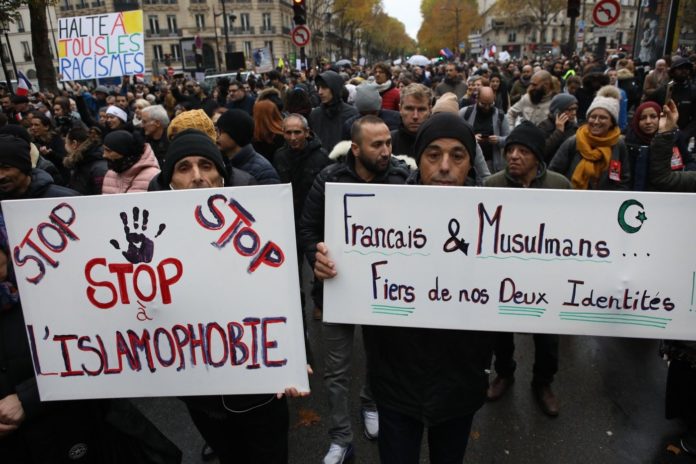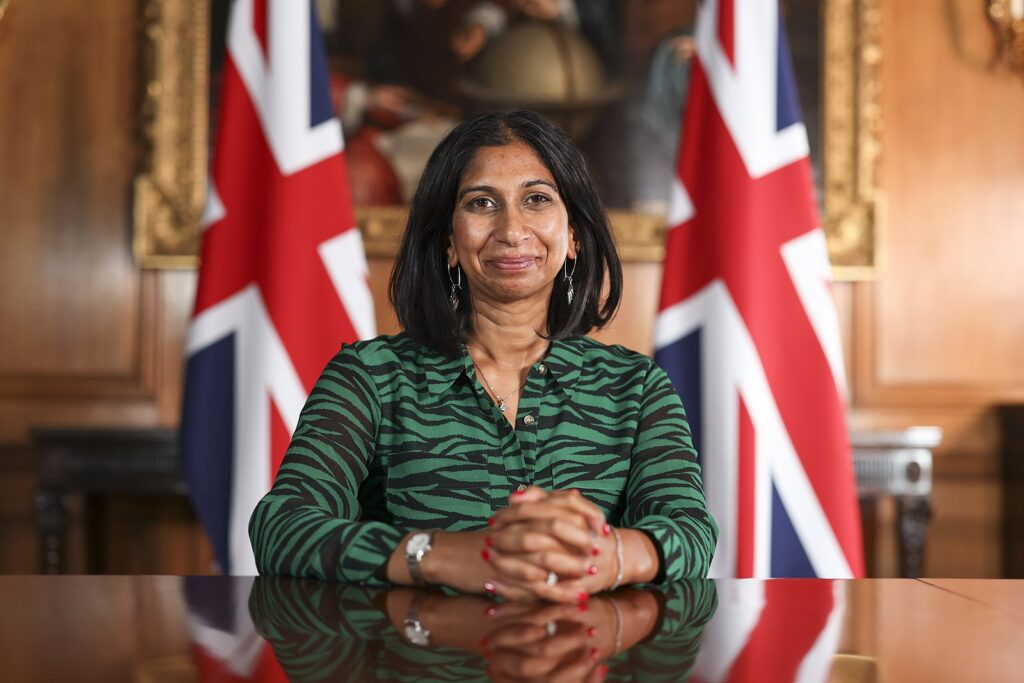
Israel’s genocidal attacks on the Gaza Strip are leading to a rise in Islamophobia across Europe, according to a major new report.
The “European Islamophobia Report 2023,” examined anti-Muslim sentiment in 28 European countries, and revealed that Israel’s current attacks on Gaza have led to a notable increase in Islamophobia in Western Europe.
The report was edited by Enes Bayrakli from the Turkish-German University in Istanbul and Farid Hafez from William & Mary University in the U.S.
On Gaza, the report said the war exacerbated Islamophobic rhetoric, framing pro-Palestinian solidarity as extremism, leading to protest bans and other restrictive measures in countries like Germany, France, and Denmark
“No other political development has shaped the life of Muslims in 2023 as much as the war in Palestine,” the report said. “With the rising voices against the genocide in Gaza also coming from Muslims in European countries, the political response by various governments has put Muslims into an even more securitized position.”
Key highlights of the 2023 report include:
- Neglect of the International Day to Combat Islamophobia: Apart from Spain, no European government recognised this UN-designated day in 2023.
- Mainstream and far-right media, along with social media platforms, amplified anti-Muslim narratives, dehumanising Muslims and fostering disinformation.
- Hate crimes against Muslims increased significantly, especially in Norway, Spain and Greece.
- Legal and educational systems perpetuated biases against Muslims, with France and Denmark enforcing controversial policies targeting Muslim communities.
The report also focused on Islamophiobia in several European countries:
Subscribe to our newsletter and stay updated on the latest news and updates from around the Muslim world!
United Kingdom
Aristotle Kallis, a professor at Keele University, UK, said that the UK witnessed a significant increase in Islamophobia in 2023, with a 600% surge in reported cases following the Hamas attack on Israel in October.
Mainstream Islamophobia saw a surge with the government’s anti-radicalisation program, Prevent, continuing to focus disproportionately on “Islamist extremism” despite evidence of more significant threats from far-right ideologies.

Muslims faced workplace discrimination, underrepresentation, and hostility. In education, there were issues with teacher recruitment, student discrimination, and the influence of Prevent on Muslim students. The justice system showed biases with higher Muslim incarceration rates.
Media portrayal often vilified Muslims, contributing to Islamophobia. The internet, especially post-conflict, saw a surge in anti-Muslim content, with platforms like X (formerly Twitter) under scrutiny for poor moderation.
Suella Braverman’s role as Home Secretary in 2023 is highlighted for promoting anti-Muslim sentiments through policy and rhetoric.
France
The report noted that in France, President Emmanuel Macron’s pro-Israel statements following the attacks in Gaza by the Palestinian resistance group, Hamas, have exacerbated institutional racism against Muslims.
Kawtar Najib, who authored the France section of the report, pointed out that the government’s ban on headscarves in schools has led to significant concern for Muslim students and their families. The move has been viewed as a sign of the institutionalisation of anti-Muslim sentiment in France.
Najib referenced the police killing of Nahel Merzouk, 17, in June 2023, and the subsequent lack of an immediate arrest of the officer involved, which fueled protests and fears for the Muslim community.
Germany
Fabian Goldmann, a journalist focused on improving media coverage of Islam and immigration, said that the war in Israel and Palestine marked a significant escalation in violence, discrimination, and hostility towards Muslims in Germany in 2023, reaching unprecedented levels in recent history.
Police records showed a 140% increase in Islamophobic crimes, totaling 1,464 incidents, the highest since records began. The Federal Anti-Discrimination Agency noted a record 10,772 consultation requests.

Editorial credit: Below the Sky / Shutterstock.com
Politicians and media fuelled a shift towards racist discourse, impacting various life aspects, including education and employment. This included bans on Palestinian symbols in schools and cancellations affecting cultural figures.
Migration policies became more restrictive, mirroring demands previously associated with far-right politics, with the AfD gaining significant support in polls.
German media coverage of Islam was predominantly negative, focusing on themes of violence, crime, and cultural clash. Notable outlets like Bild and Die Welt were highlighted for their role in shaping anti-Muslim discourse.
The AfD remained a key producer of Islamophobia, with individuals like Ahmad Mansour and Susanne Schröter influencing public discourse.
Switzerland
In Switzerland, researcher Nadia Lahdili found that increasing anti-immigrant sentiment has directly contributed to rising Islamophobia.
There were 1,058 Islamophobic incidents reported in 2023, including 876 involving racial discrimination and 62 instances of anti-Muslim attacks.
Lahdili noted that Muslim women, particularly those wearing headscarves, face significant discrimination in the workplace, where they are often blocked from career advancement.
The report also discussed the political exploitation of Islamic dress by politicians during election campaigns, which has contributed to increasing institutional Islamophobia.
Bosnia and Herzegovina
Hikmet Karcic from Sarajevo University highlighted the rise of radical anti-Muslim rhetoric in Bosnia and Herzegovina, particularly by Serbian nationalists.
It has led to tensions that mirror the situation in France and Switzerland, with hostile language used to weaken the multicultural fabric of Sarajevo.
The report noted that the closure of several mosques and the construction of hotels on land intended for mosques are part of efforts to erase the country’s cultural heritage and foster anti-Muslim sentiment.
Austria
Farid Hafez drew attention to Austria, where the United Arab Emirates has been implicated in funding anti-Muslim groups.
Anti-Muslim rhetoric surged after the outbreak of Israel’s attacks on Gaza, and schools in Austria held workshops against radicalisation, which, in some cases, propagated Islamophobic sentiments.
The report also highlighted how protests against the Gaza violence were suppressed by police, with Austria voting against a UN General Assembly resolution that urged a cease-fire.
To address these challenges, EIR 2023 calls for:
- Full recognition of Islamophobia as a systemic issue by European governments.
- Strengthened legal frameworks to combat discrimination and hate crimes.
- Increased efforts by civil society and international organizations to promote inclusivity and counter anti-Muslim narratives.
- Enhanced monitoring and accountability for media and social media platforms to prevent the spread of hate speech and disinformation.






















